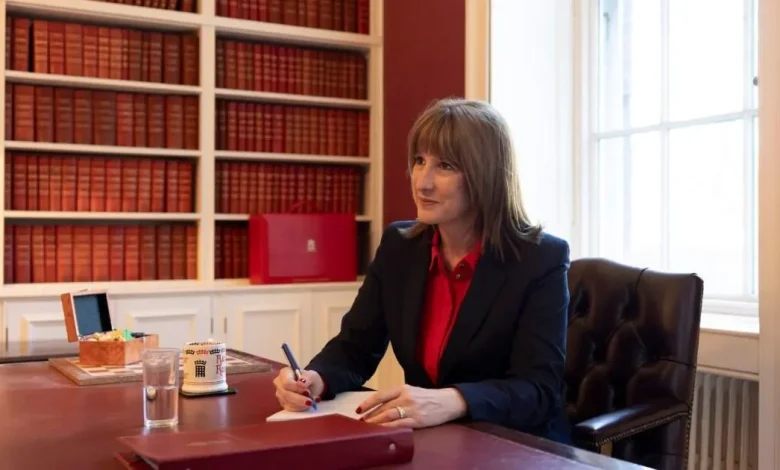Help to Save scheme: What you need to know about Rachel Reeves’ Budget announcement

Chancellor Rachel Reeves looks over her speech as she prepares for the Budget, in No 11 Downing Street (Credits: Kirsty O’Connor / Treasury)
More people on low incomes will get help saving money through a government-backed scheme that offers a hefty cash bonus, the Treasury said ahead of the Budget.
Chancellor Rachel Reeves will announce that the Help to Save scheme will be made permanent and opened up to parents and carers.
It means an extra 1.5million people will become eligible for the scheme as part of Labour’s attempts to ease the cost of living.
Follow Metro’s live blog for full coverage of the Autumn Budget 2025
Here’s what you need to know about it.
How Help to Save works
Help to Save is designed to incentivise lower income people to stash away money and make saving cash easier.
It offers a bonus of up to £1,200 paid straight into the savers’ bank account, split into two payments after two and four years.
Savers must be on universal credit and have a job with take-home pay of £1 or more per month to be eligible.
Savers can put in as little as £1 a month to their Help to Save account (Getty Images)
The scheme lets you put away £50 a month over a four-year period, which works out to £2,400.
The bonus is worked out as 50% of what you have paid into the account, up to the maximum of £1,200 over the four-year period.
What’s changing?
The scheme, widely seen as a key way to get people saving, was previously set to run out in 2027, but now it is being made permanent.
And from 2028 onwards, it will open up to 1.5million more people who are parents and carers on universal credit.
Chancellor Rachel Reeves will deliver the Autumn Budget on Wednesday afternoon (Reuters)
A Treasury source said: ‘For too long governments have ignored the role of carers and parents in keeping the economy ticking.
‘The Chancellor wants to change that and help millions more working people build a savings habit.’
The scheme will be expanded to include benefit claimants who have children in education and carers who provide 35 hours of care to a disabled person.
Does it work?
There were 2.7million people on Universal Credit who were also in employment at the end of last year.
But only 575,000 customers have opened a Help to Save account since the scheme was launched in September 2018, according to official data, paying £588million into their savings pots.
That means only one-in-five eligible households have used it so far.
Only one-in-five eligible households have actually used Help to Save since it was started in 2018 (Getty Images)
Charlene Young, senior pensions and savings expert at AJ Bell, said: ‘The reality is that lots of people aren’t aware of the generous bonus and how it works if they were able to put a bit away every month.
‘This is coupled with the fact that lots of people on benefits or lower incomes are unlikely to have spare money to save each month, even if they wanted to.’
Deven Ghelani, chief executive of welfare group Policy In Practice, added: ‘With costs rising, low income families are struggling to stay on top of bills, never mind having money to put aside.’
Why is it useful?
Labour has positioned this Budget as one that tackles the high cost of living for lower income and working people.
But some of the other measures that will reportedly be announced have been criticised for doing the opposite – for example cutting the amount of money that people can save tax-free in a Cash ISA.
Reeves and Prime Minister Keir Starmer have positioned the Budget as helping working people (Reuters)
The savings limit for Cash ISAs is set to be reduced to £12,000 a year, down from £20,000, amid a push to get people investing in the stock market instead.
It’s also thought that Reeves will also extend a freeze on income tax thresholds past the current 2028-29 deadline, which will cause people to pay more tax in the long run.
Grace Brownfield, head of debt advice communications at the National Debtline service, told Metro making Help to Save permanent is ‘a welcome step – especially extending it to parents and carers who are often most exposed to financial shocks.’
‘But for many, the biggest barrier to saving is having nothing left at the end of the month, so this must go hand-in-hand with wider measures to tackle the cost of living.’
Get in touch with our news team by emailing us at webnews@metro.co.uk.
For more stories like this, check our news page.
Arrow
MORE: The amount you need in your emergency fund for a proper financial safety net
Arrow
MORE: Pub owners say booze tax hike would be ‘vindictive’ and drive up drinks prices
Arrow
MORE: Full list of drinks set to be hit with Budget sugar tax – including popular milkshakes
Comment now
Add Metro as a Preferred Source on Google
Alright Gov
Straight-talking analysis from Westminster, straight to your inbox.





